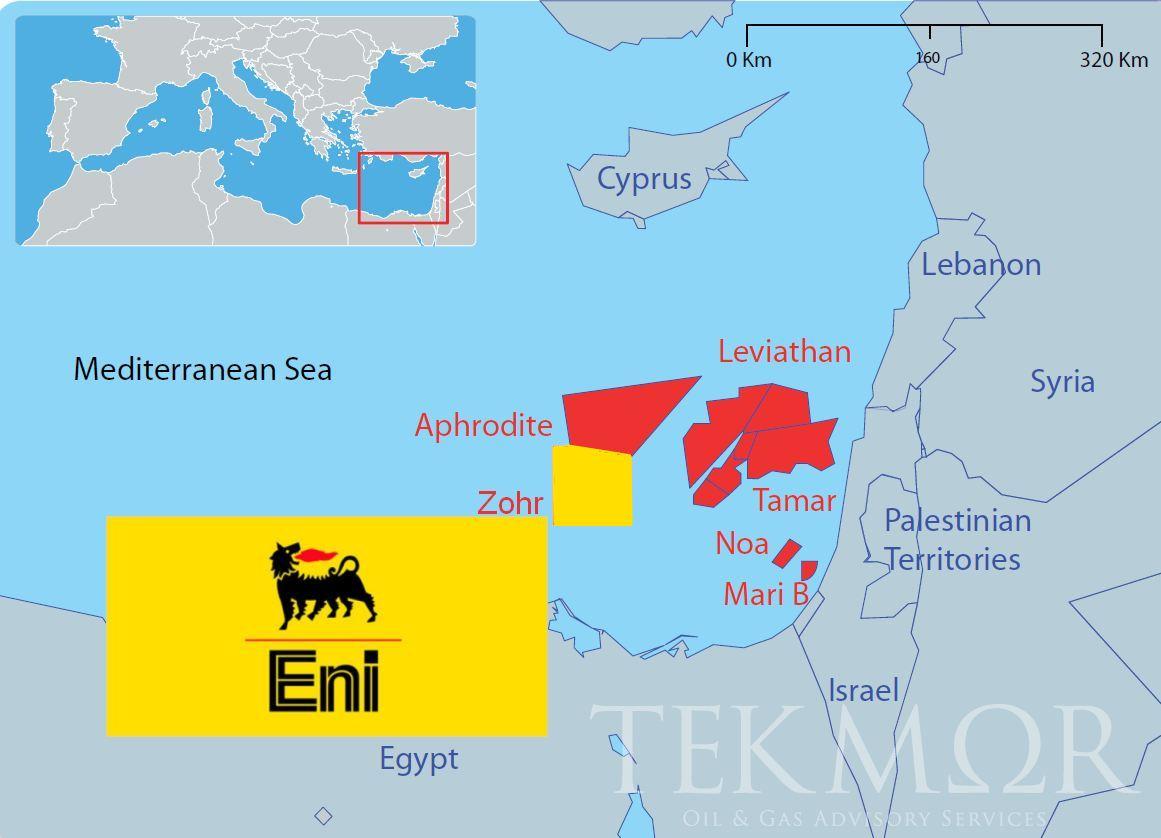
Lebanon and Israel have been involved
in a maritime dispute regarding the exact location of their sea borders. The
contested area is important to both countries because it harbors natural-gas fields. Israel has one of the largest gas
fields in the region, the Leviathan field.
Parts of that field could potentially extend into territory claimed by both
Israel and Lebanon. This gas deposit is so big, it is leading to
Israel becoming a major energy exporter.
Meanwhile, Egypt has what has been called a
"supergiant gas field" within its waters, the Zohr gas field.
The Trump
administration this week asked Egyptian authorities for a seat at the table at
an upcoming energy summit in Cairo, seeking a leading role in the establishment
of a major gas forum in the Eastern Mediterranean.
U.S. national
security officials see strategic value in the success of the Egyptian project,
which could eventually wean European allies off their dependence on Russian
fuel and provide the basis for improving relationships. “That’s the roadmap to
Middle East peace,” one official said, “building up cooperation that’s clearly
in your best interests.”
During Egyptian
President Abdel Fattah al-Sisi’s visit to Washington on Tuesday, Trump’s top
aides asked their Egyptian counterparts if the United States could attend the
second meeting of the Eastern Mediterranean Gas Forum, a group that Cairo
launched in January with Jordan,
Italy, Greece, Cyprus, Israel and the Palestinian Authority.
It would be the Trump
administration’s first time engaging with the forum, designed to allow
participating nations to develop their newly discovered gas reserves in
concert, optimizing extraction and export options that will help them compete
in an increasingly crowded gas market.
“We would like the
United States to have an observer role for the forum,” one of the officials
said. “It’s our position that with our technical expertise and our market role,
it would be very helpful for us to be involved.”
U.S. Energy Secretary Rick Perry would attend the meeting, expected to
take place in Cairo, the official hub of the forum, later this month. The goal
of the meeting is to “see more of the structure of the forum and the practical
implications of it,” one senior official said.
“Right now, the forum
is pretty conceptual. And where the U.S. can play a helpful role is getting it
to reality,” the official added. “This is going from a concept of peace to a
tangible result of it.”
The group has only
met once before at the ministerial level and brings together parties with
historically cold relations, such as Israel and the Palestinian Authority,
which administers significant gas fields off the Gazan coast.
Israel first
discovered major offshore gas reserves, named Tamar and Leviathan, over the
past decade. Major U.S. energy companies had previously shied away from working
in Israel due to its tense relations with oil-rich Gulf neighbors and the false assumption that
there were no significant energy resources to be found.

U.S.-based ExxonMobil
is now consideringestablishing
a presence in Israel and company officials met last month in Houston with
Israeli Energy Minister Yuval Steinitz for preliminary talks.
Expanding
opportunities for U.S. energy companies and brokering “practical alliances”
based on natural resource requirements is an organizing principle of the Trump
administration, the officials said, characterizing President Donald Trump as
“enthusiastic” about the Egyptian initiative.
It is one basis of the administration’s greater design
for regional peace in the Middle East, in which opposing parties recognize the
economic benefits of cooperation. Egypt is at the center of that vision, the
administration officials said.
But their enthusiasm
for Egypt’s leadership on the gas forum stands in contrast with their
disappointment over Cairo’s decision this
week to withdraw from a major strategic alliance the Trump administration is
trying to build to confront Iran.
“To our
understanding, [the Egyptians] have concerns – as we understand, as everyone
would – of entering into a new alliance of that sort,” one senior
administration official told McClatchy, confirming Cairo’s notice to the United
States that it would pull out of the emerging group known as the Middle East Strategic Alliance.
“We remain extremely enthusiastic about the potential for MESA.”
One primary goal for
the gas forum is to explore cost-efficient ways to export regional gas to
Europe, its closest and wealthiest market.
The Trump
administration has harshly criticized European governments – especially Germany
– for its reliance on Russian natural gas, an argument it has used to push back
against European Union claims that Washington is retreating from its support
for NATO.
“If Germany persists
in building the Nord Stream 2 pipeline, as President Trump said, it could turn
Germany’s economy into literally a captive of Russia,” Vice President Mike
Pence said this month
at a NATO anniversary event in Washington, referencing a proposed pipeline that
could double Germany’s imports of Russian gas.
The shipment of the
gas remains an expensive endeavor. Egypt already has two liquefaction plants
that provide the basis for a shipment strategy. And Secretary of State Mike
Pompeo encouraged Israel, Cyprus and Greece to proceed on talks over a $7
billion Eastern Mediterranean pipeline in a visit to the region last month.
Other administration
officials offered cautious optimism on the potential for a pipeline, however,
warning that its price tag could raise the cost of the Eastern Mediterranean
gas out of Europe’s reach.
“Our understanding is it’s the longest and deepest
pipeline ever proposed,” said one senior official. “But what’s technologically
challenging today might be less so in several years.”



No comments:
Post a Comment